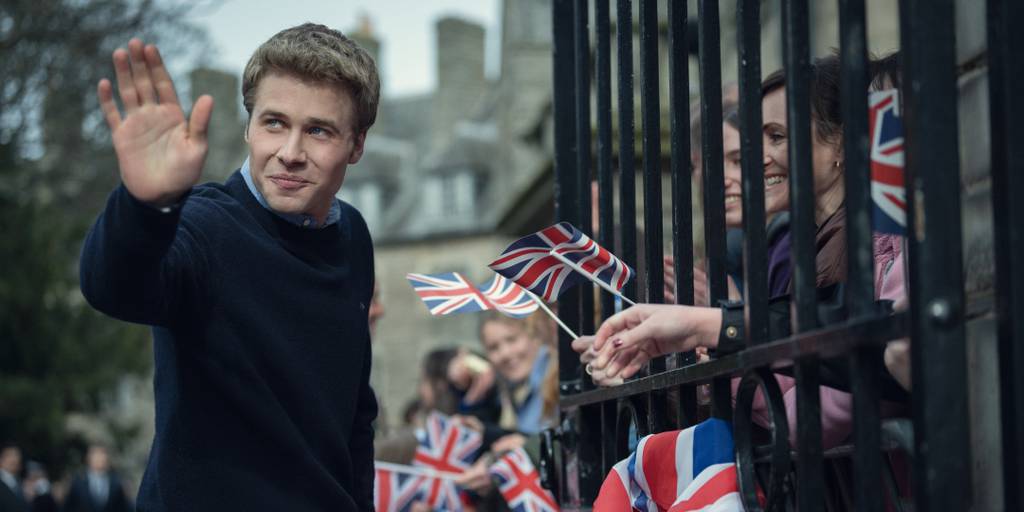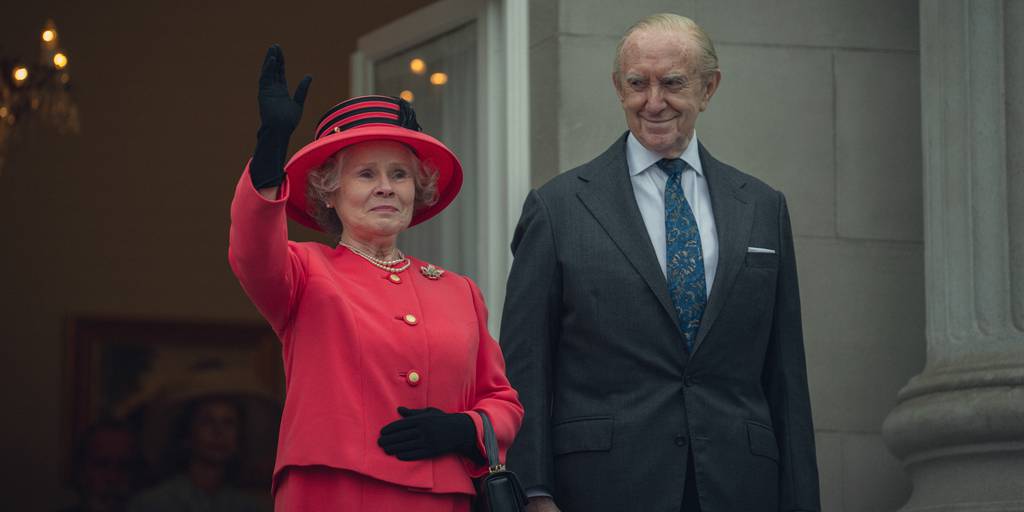[ad_1]
Despite a big budget, lavish visuals and a rotating cast of talented actors who look distinctly better than their real-life counterparts, “The Crown” ends its six-season run on Netflix by revealing surprisingly little beneath the mysterious façade of the royal family.
At a time when the monarchy is forever grappling with the loss of credibility off-screen, “The Crown”’s (mostly) deferential approach proves even more puzzling.
Biopics and their TV counterpoints, by design, have to decide what details to include and what to leave out. Series creator Peter Morgan has made it clear that some things are off-limits. Despite Prince Andrew’s friendship jeffrey epstein Although it occurred during the time period covered by the final season, this detail is missing. Meanwhile, an entire episode focuses on Princess Margaret’s failing health and death. Both events are important in Queen Elizabeth’s life. Choosing one over the other reveals the limits of Morgan’s curiosity and courage.
If first half While the first episode of Season 6 benefits from a tight focus on the months leading up to Princess Diana’s death in 1997, the second half is a mess by comparison.
Prince William (Ed McVey) and his pain are at the center, as are the early days of his relationship with his future wife, Kate Middleton (Meg Bellamy). Duo, St. They met as classmates at the University of St. Andrews, but neither of them are given much insight into their character depth. This leads to an unconvincing romance. Perhaps this is the most telling observation of this season, whether intentional or not.
There is also a narrative arc in which Queen Elizabeth (Imelda Staunton) considers and then rejects attempts to modernize the Firm, in addition to the aforementioned Margaret parts, resulting in the death of the queen’s mother a month later.
What impact did these losses have on him? The series has no insight whatsoever, which seems more a matter of taste than a failure to capture the experience of grief. This also applies to William. Losing a parent is brutal and destabilizing, but “The Crown” fails to develop William as a person beyond his expressions of grief. While the series assumes you’ll fill in these gaps with biases you already have, William’s interiority remains a mystery.
If there’s one particular perspective on anyone in the series, it’s Charles. His profound inability to center anyone’s emotions other than his own is comical in its absurdity. If only William wasn’t so upset, it would make his life so much easier! What about his other son? Harry serves as a minor side character in “The Crown” and is a nasty and corrupting influence on his brother. When William turns to alcohol for liquid courage or to numb his emotions, it is Harry who gives him the drink. It’s a subtle but deliberate storytelling choice, and I don’t know what to make of it. But at least this is a characterization that suggests: personality. The show’s understanding of William is hollow.
But for most of The Crown he had no real ambition. An expensively crafted Wikipedia page is implemented and often falls back on the “this happened, then that happened” approach. Where is the wild speculation and author-generating ideas? Domestic backbiting gets no attention here. But if these people are willing to throw each other under the bus with strategic use of press briefings, that seems like a family dynamic worth exploring.
Sometimes the show packs a punch. As the heir, William becomes uncomfortable with the pressure to be reasonable, while Harry begins to become Harry. “Don’t you think I want to be a popular rogue?” yell. No such luck, Harry quickly retorts: “To be a lovable rogue, you first have to be likable.” Zing!
Morgan said he chose not to read Harry’s memoir, “Spare,” before writing the final season because he didn’t want Harry’s voice in his head. Understandable impulse. But Harry is the only royal to have written a fairly detailed insider account of how the family and the monarchy really work. Morgan doesn’t need to take this at face value. But it seems like useful context. What sources did Morgan rely on instead, and why wasn’t he equally concerned that they would unduly influence his thinking?

This question seems odd, especially in light of “The Crown”’s portrayal of Camilla. For years, he was rumored to be manipulating press reports behind the scenes by leaking or planting stories favorable to himself, sometimes at the expense of Charles’ sons. The program considers these speculations irrelevant. Camellia is brave and determined. End.
Sometimes this choice does not coincide with reality. Diana died in August. By March, Charles decided to have his sons accompany him on an official trip to Vancouver, and he was surprised by William’s popularity with the teenage crowd. Camilla notes that this is eerily familiar. “It’s painful to watch,” Charles replies, “because unlike Diana, Will is a shy old thing.”
Or even wait. Diana’s nickname was “Shy Di”. Is Morgan being ironic and being manipulated by Charles’ ignorance? Or has the show itself been lost in the mists of historical revisionism?
The first half of the season was open about Mohamed Al-Fayed’s marriage plan, and I was wondering if that would also apply to Kate’s mother, Carole Middleton. As parents, they are mirror images, and Morgan is kind of getting there, too. But it’s worth thinking hard How the show feels like their parallel efforts.
Mohamed (Salim Daw) is scheming and rude, while Carole (Eve Best) wants only the best for her daughter and gently but firmly pushes her in that direction because “the poor kid needs a good, normal girl.” It’s fascinating to see the subtle differences in meanings. Mohamed wanted royal proximity for selfish and social uplift reasons. Carole acted so Love for his daughter and therefore for William.
“The Crown” hints at larger questions about the importance of the monarchy — the queen’s refusal to give up the guardian of the swans is seen as a kind of moral stance — but it does so in a way that sidesteps the most pressing questions. “Racist royals” is a phrase that is actually said, and which sounds positively radical to Morgan—but those words are overshadowed by the framework of the show; They are attributed to Muhammad for his unfounded and increasingly paranoid belief that the Palace had Diana and her son killed. Regardless, there’s probably an all-white courtier somewhere along that line.
This month, palace aides have been speculating wildly. revelations A report named two members of the royal family who raised concerns about the skin color of Meghan Markle’s children with Harry during her first pregnancy.
“We’re not exactly a racist family,” William awkwardly assured a group of reporters a few years ago. As the latest news cycle has shown, it’s an accusation that nevertheless remains persistent. But “The Crown,” about an institution that built its wealth on slavery and colonialism, presented a version of events that suggested the opposite throughout its six-season run.
I go back to my last thoughts about last season: What does adhering to monarchy say about a nation’s identity? What if the series took a riskier perspective and wondered who would benefit from these porcelain dolls being protected at all costs?
“The Crown” Season 6 Episode 2 — 2.5 stars (out of 4)
Where to watch: netflix

Nina Metz is a Tribune critic.
nmetz@chicagotribune.com
 Best American Comics News bestamericancomics.com started its broadcasting life on December 21, 2022 and aims to offer original content to users. Aiming to share information in technology, science, education and other fields, bestamericancomics.com aims to provide its readers with the most up-to-date and comprehensive. Since the content of the site is created by expert writers, readers are reliable and accurate referrers.
Best American Comics News bestamericancomics.com started its broadcasting life on December 21, 2022 and aims to offer original content to users. Aiming to share information in technology, science, education and other fields, bestamericancomics.com aims to provide its readers with the most up-to-date and comprehensive. Since the content of the site is created by expert writers, readers are reliable and accurate referrers.


